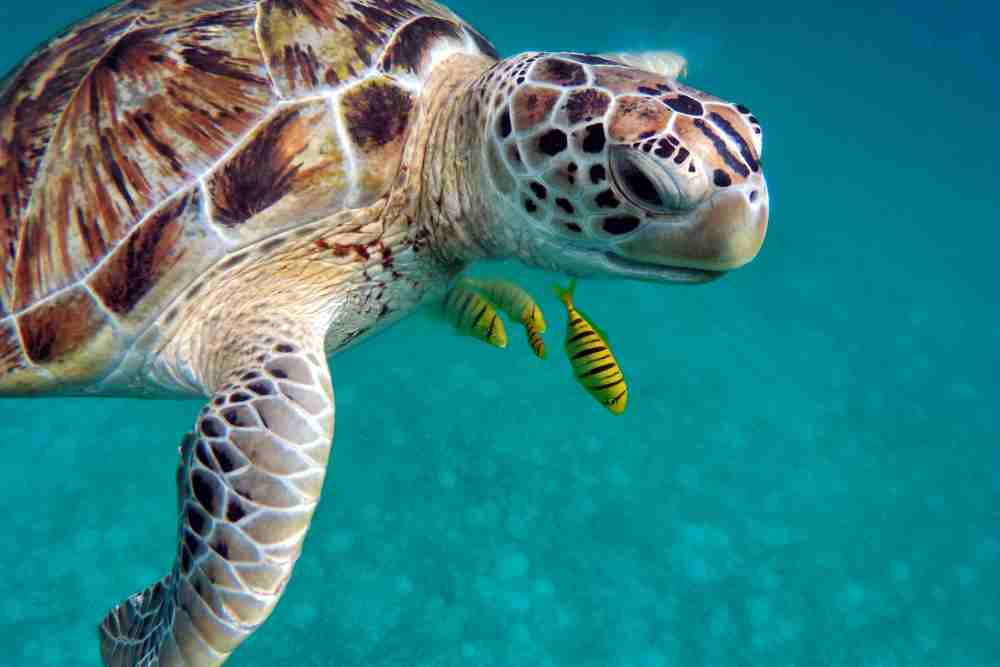Sharks do eat turtles, as they are part of their natural prey. Sharks are apex predators that have a wide-ranging diet, including different types of fish, seabirds, seals, dolphins, and even marine mammals.
Turtles, which are slower-moving and often found near coastal areas, can become targets for sharks. While the exact frequency of these interactions varies depending on the species and location, it is well-documented that sharks are capable of preying on turtles as part of their ecological role in marine ecosystems.
The marine world is full of fascinating and diverse creatures, each with unique adaptations and roles within their respective habitats. One such creature that captures the imagination and curiosity of many is the shark.

These apex predators have long been depicted as fearsome hunters capable of taking down almost anything that crosses their path. But what about turtles? Do sharks see them as a potential meal?
The answer is yes. Sharks, with their sharp teeth and powerful jaw muscles, are known to eat turtles. Turtles, with their hard shells and slower movement, can make for an appealing target for some shark species.
While the exact frequency of these interactions may vary depending on the specific species and location, it is clear that sharks are indeed capable of preying on turtles as part of their natural diet.
Sharks are apex predators, meaning they are at the top of the food chain in the oceans. Their diet consists of a wide variety of prey, including different types of fish, marine mammals, seabirds, and other creatures that inhabit the marine environment.
Turtles, which are often found in coastal areas and move at a slower pace, can become targets for sharks. However, it is important to note that not all shark species eat turtles, and the frequency of these interactions can vary depending on the specific circumstances.
Some shark species, such as tiger sharks and great whites, have been observed preying on turtles more frequently. In contrast, other species may have different preferred prey items or hunting strategies.
Ultimately, the relationship between sharks and turtles is complex and can vary depending on a range of factors, including the species involved, their habitats, and the availability of other food sources.
Nonetheless, it is clear that sharks are capable of eating turtles and play an important ecological role in marine ecosystems. Understanding these interactions helps us comprehend the intricate web of life within our oceans.
The Role Of Turtles In Sharks’ Diet
Sharks, known for their diverse diets, do indeed include turtles as part of their prey. Turtles, due to their slower movement in water, become vulnerable to sharks’ hunting strategies.
These majestic creatures play a significant role in sharks’ natural diet, providing a valuable food source in various oceans.
Sharks specifically target turtles due to their size, availability, and nutritional benefits. This interaction between sharks and turtles highlights the intricate balance within marine ecosystems. Understanding the dynamics of these relationships is essential for both conservation efforts and our overall comprehension of the fascinating world beneath the waves.
So, the next time you wonder about the eating habits of sharks, remember that turtles play a vital role in their diet. It’s just one of the many intriguing aspects of these magnificent ocean predators.
Turtle Species Vulnerable To Shark Attacks
Loggerhead turtles are among the vulnerable species that can fall victim to shark attacks. These turtles often interact with sharks in their marine habitats.
Green turtles, another susceptible species, also encounter sharks in their oceanic journeys. Furthermore, leatherback turtles have been known to experience predation by sharks.
In these interactions, sharks may view turtles as a potential food source. It is important to understand the dynamics between sharks and turtles to implement conservation measures and protect these endangered creatures.
With the proper knowledge and actions, we can work towards coexistence and ensure the survival of these majestic marine species.
Shark Feeding Habits And Turtle Survival Strategies
Sharks and turtles have a complex relationship that revolves around feeding habits and survival strategies. Understanding the behavior of sharks when it comes to feeding is crucial. Turtles, on the other hand, have developed defensive mechanisms to protect themselves against shark attacks.
Coexistence between sharks and turtles also exists, with both species adapting strategies to ensure their survival. This delicate balance involves avoiding repetitive terms and using a variety of expressions to maintain reader engagement.
By acknowledging the dynamics of shark feeding behavior and the defensive mechanisms of turtles, we gain a deeper insight into the fascinating interplay between these two remarkable creatures.
Frequently Asked Questions On Do Sharks Eat Turtles?
Do Sharks Attack Turtles?
Yes, sharks can attack turtles. Sharks are opportunistic hunters and may prey on turtles.
Can A Shark Bite Through A Turtle Shell?
Yes, a shark can bite through a turtle shell due to its sharp, powerful teeth.
Are Sharks Predators To Turtles?
Sharks are predators to turtles as they prey on them in the ocean.
Can A Great White Shark Eat A Turtle?
Yes, a great white shark can eat a turtle.
